Software architects are the masterminds behind the structure and design of software systems. They ensure that the software meets both functional and non-functional requirements, balancing the needs of the business with technical constraints.
Skills for a software architect include a deep understanding of software design principles, proficiency in various programming languages, and the ability to communicate complex technical concepts clearly.
Candidates can write these abilities in their resumes, but you can’t verify them without on-the-job Software Architect skill tests.
In this post, we will explore 8 essential Software Architect skills, 10 secondary skills and how to assess them so you can make informed hiring decisions.
Table of contents
8 fundamental Software Architect skills and traits
The best skills for Software Architects include System Design, Technical Leadership, Risk Management, Data Modeling, API Design, Performance Optimization, Security Principles and Cloud Computing.
Let’s dive into the details by examining the 8 essential skills of a Software Architect.
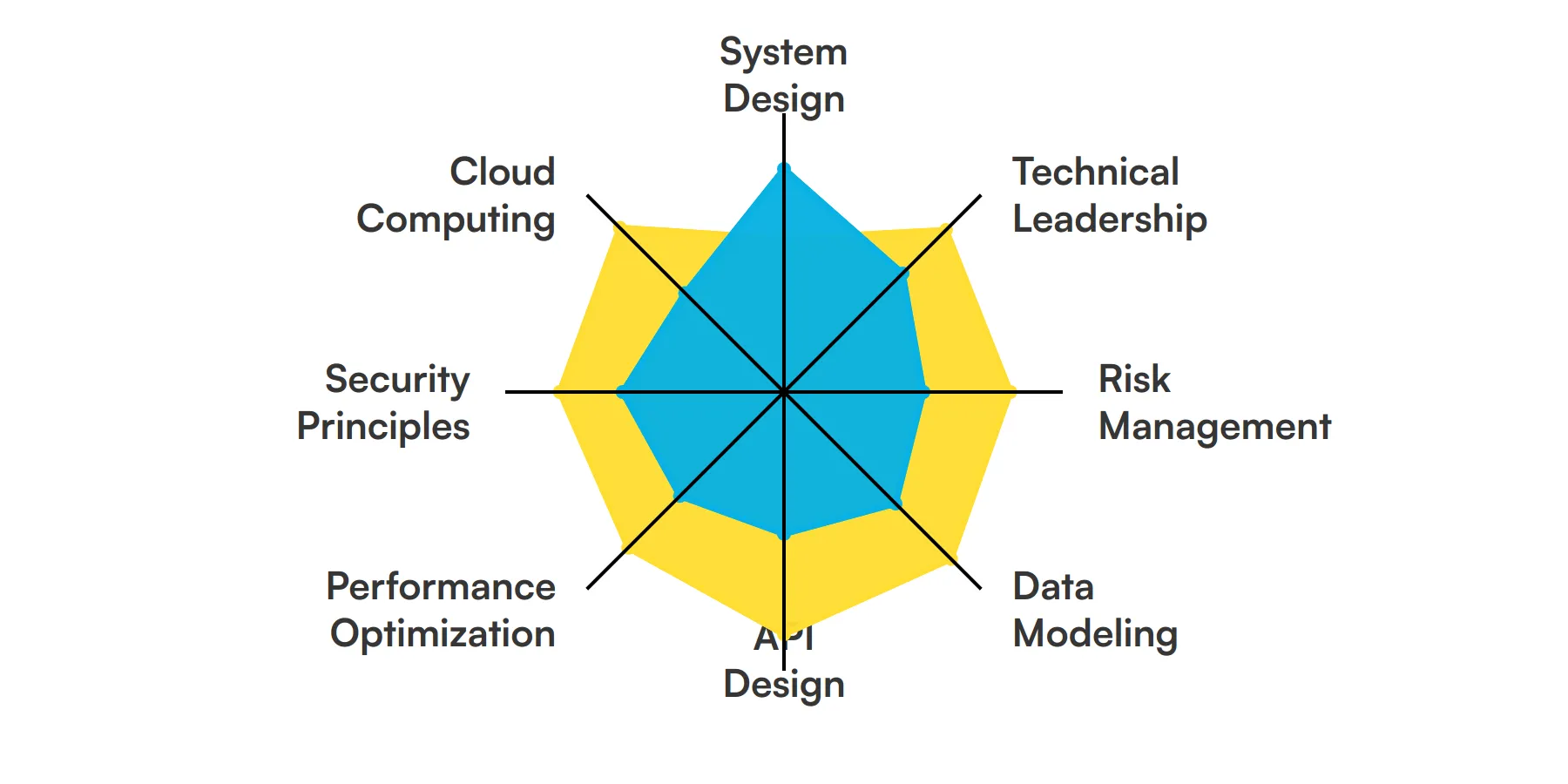
System Design
A software architect must be adept at creating scalable and efficient system architectures. This involves understanding and integrating various software components and technologies to meet specific business requirements. The role uses this skill to ensure that the system is robust and can handle the expected load and performance criteria.
Check out our guide for a comprehensive list of interview questions.
Technical Leadership
This skill involves guiding development teams and making critical technical decisions. A software architect uses technical leadership to drive the project's technical direction and ensure alignment with business goals. It's about mentoring teams and setting technical standards.
Risk Management
Identifying, analyzing, and mitigating risks in software projects is crucial. The software architect uses this skill to foresee potential issues in the development process and create strategies to address them, ensuring the project stays on track and within budget.
For more insights, check out our guide to writing a Risk Analyst Job Description.
Data Modeling
Data modeling is essential for designing and defining data structures in a way that they support the software's functionality. The software architect uses this skill to ensure data integrity and efficiency of access, which are critical for the performance of the software.
API Design
Designing effective APIs is key for the integration of different software systems. A software architect must ensure that APIs are secure, scalable, and maintainable. This skill impacts how well different software components can communicate and operate with each other.
Performance Optimization
The ability to enhance software performance involves analyzing and improving existing code and architecture. A software architect uses this skill to ensure that the software meets speed and efficiency requirements, which are critical for user satisfaction and system scalability.
Security Principles
Understanding and applying security principles is necessary to protect the system from potential threats. The software architect incorporates security measures into the architecture from the ground up, safeguarding data and operations against security breaches.
Check out our guide for a comprehensive list of interview questions.
Cloud Computing
Knowledge of cloud services and architecture is essential for modern software deployment. The software architect uses this skill to design systems that leverage cloud technologies for enhanced scalability, reliability, and performance.
10 secondary Software Architect skills and traits
The best skills for Software Architects include Agile Methodologies, DevOps Practices, Code Review, Documentation, Stakeholder Communication, Continuous Learning, Problem Solving, Project Management, User-Centric Design and Networking Basics.
Let’s dive into the details by examining the 10 secondary skills of a Software Architect.
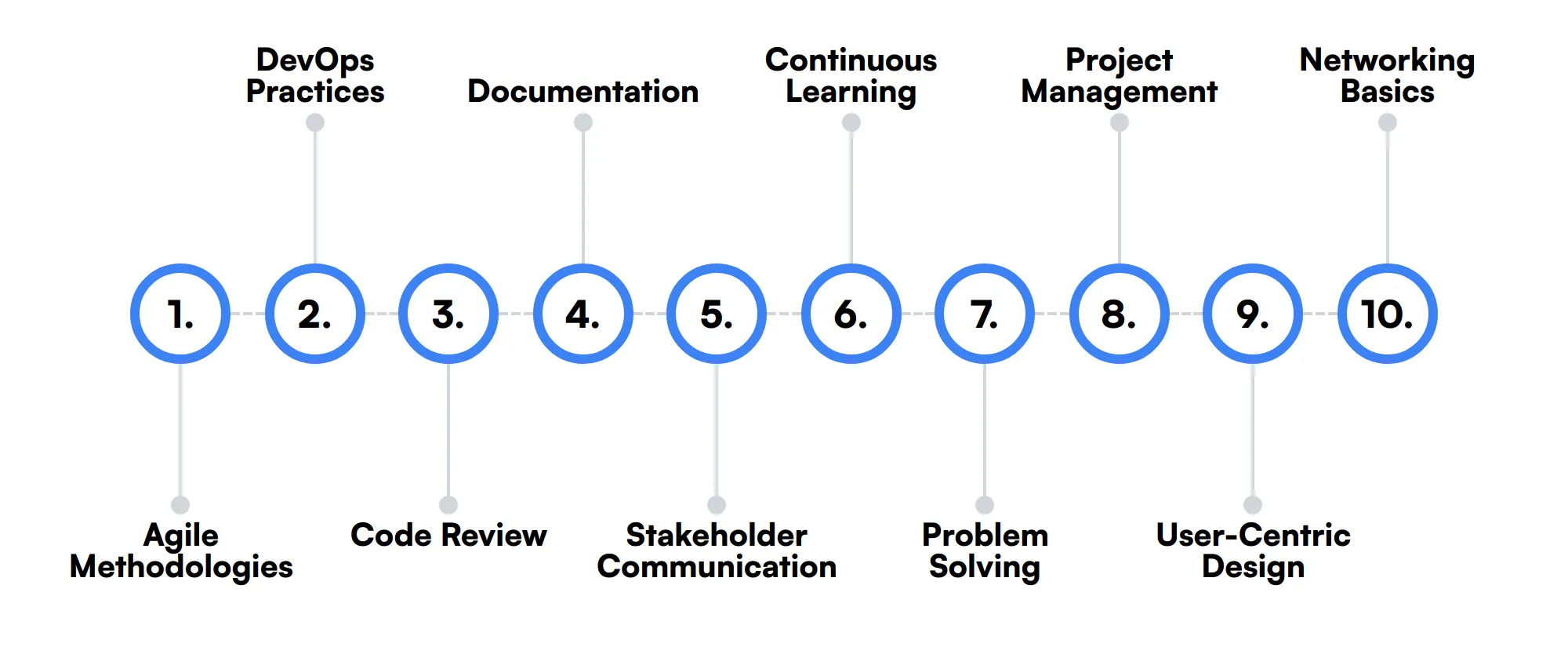
Agile Methodologies
Familiarity with agile practices helps software architects manage projects that require flexibility and iterative development.
DevOps Practices
Understanding DevOps is important for software architects to streamline development, deployment, and maintenance processes.
Code Review
Proficiency in code review ensures that the software architect can maintain high code quality and consistency across the team.
Documentation
Effective documentation skills are necessary for maintaining clear and useful project documentation and architectural guidelines.
Stakeholder Communication
Ability to communicate effectively with stakeholders ensures that software architects can align technical solutions with business needs.
Continuous Learning
The technology landscape is always evolving, and staying updated with the latest technologies and practices is beneficial for a software architect.
Problem Solving
Strong problem-solving skills help software architects to efficiently tackle technical challenges during the project lifecycle.
Project Management
Basic project management skills assist software architects in overseeing project timelines and resource allocation.
User-Centric Design
Understanding user needs and designing architectures that cater to these needs is beneficial for creating effective software solutions.
Networking Basics
Knowledge of networking is useful for designing systems that are optimized for expected network loads and performance.
How to assess Software Architect skills and traits
Assessing the skills and traits of a Software Architect can be a challenging task. These professionals need a blend of technical expertise and leadership abilities to design and manage complex systems. It's not just about knowing the right technologies; it's about applying them effectively to solve real-world problems.
Traditional resumes and interviews often fall short in evaluating a candidate's true capabilities. This is where skills-based assessments come into play. By focusing on key areas such as System Design, Technical Leadership, Risk Management, Data Modeling, API Design, Performance Optimization, Security Principles, and Cloud Computing, you can get a clearer picture of a candidate's proficiency.
To streamline this process, Adaface assessments offer a reliable way to evaluate these skills, leading to a 2x improved quality of hires and an 85% reduction in screening time. These assessments are designed to mimic real-world scenarios, providing a more accurate measure of a candidate's abilities.
Let’s look at how to assess Software Architect skills with these 6 talent assessments.
System Design Online Test
System Design Online Test evaluates proficiency in designing software systems that meet functional and non-functional requirements.
The test assesses candidates' ability to identify system requirements, choose appropriate architectures and design patterns, and create high-level design specifications. It covers database design, data modeling, system integration, security, performance optimization, and quality assurance.
Successful candidates demonstrate a strong understanding of system design, algorithm and data structures, network protocols, database design, distributed systems, cloud computing, performance optimization, and microservices architecture.
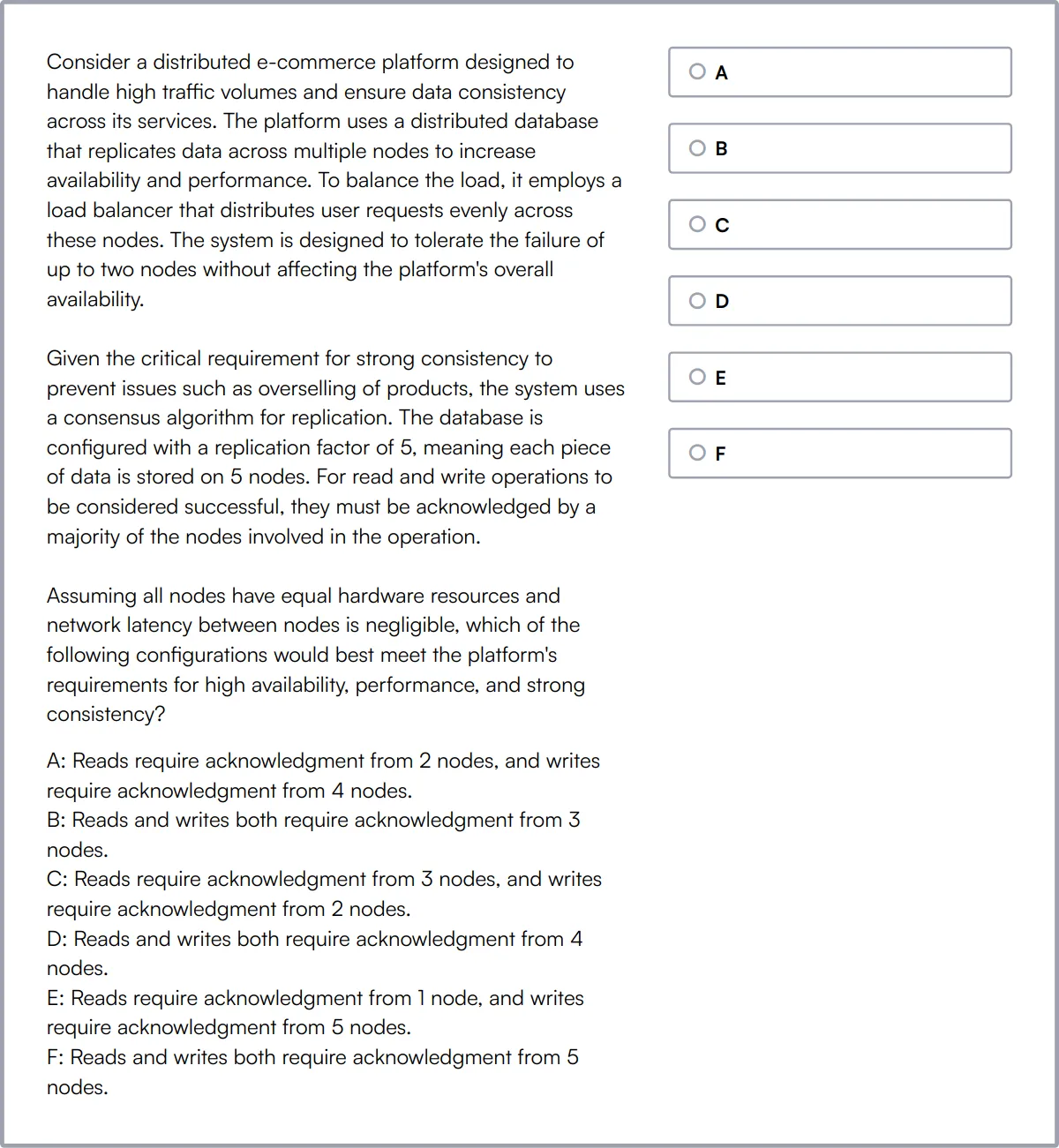
Leadership Psychometric Test
Leadership Psychometric Test evaluates candidates on their personality traits and cognitive abilities through scenario-based MCQs.
The test covers the Big 5 personality traits, situational judgment, logical reasoning, verbal reasoning, and spatial reasoning. It assesses emotional intelligence, conflict management, communication skills, decision making, problem solving, time management, and strategic thinking.
High-scoring candidates show strong conscientiousness, agreeableness, openness, extraversion-introversion, and neuroticism. They also excel in emotional intelligence and conflict management.
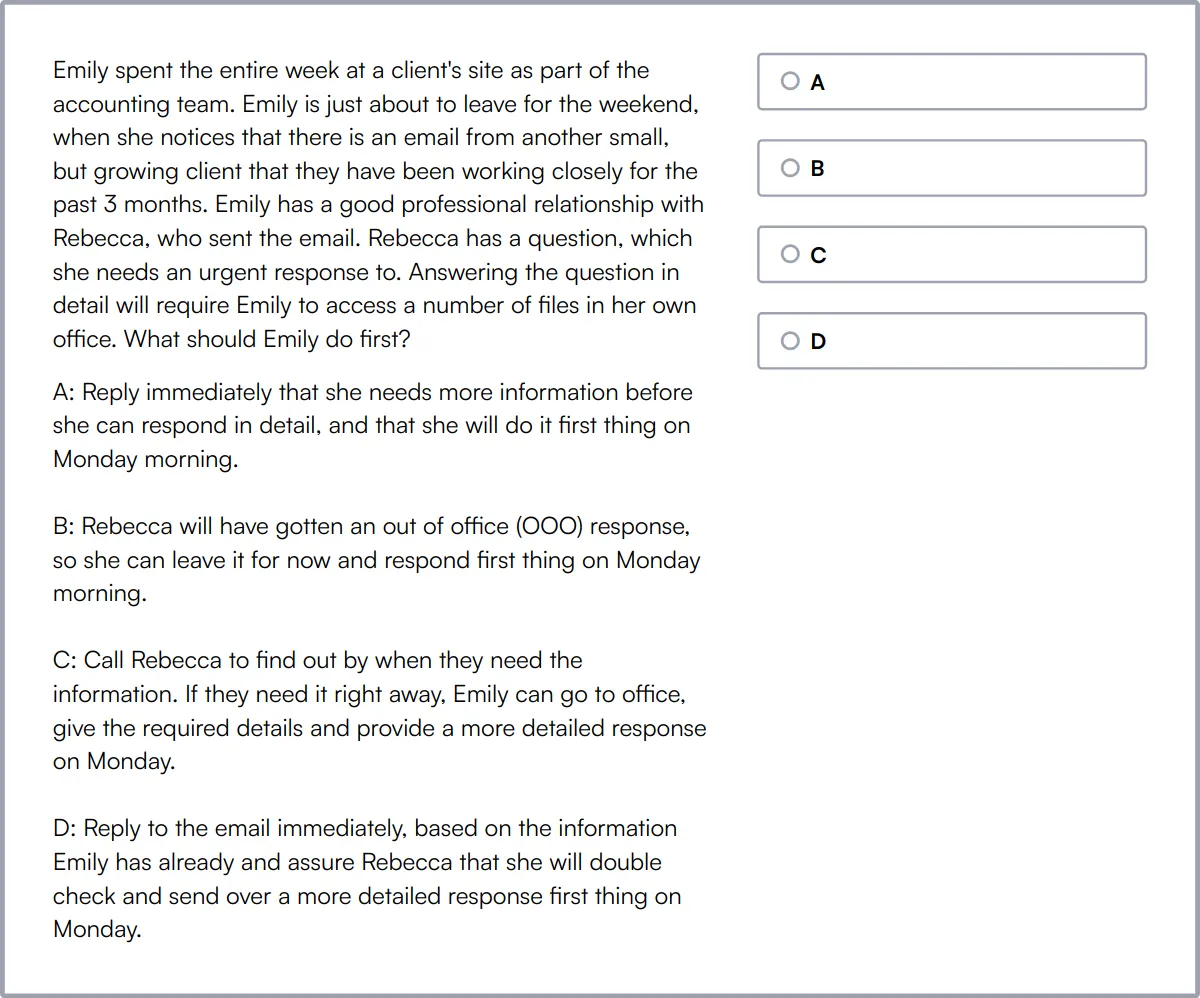
Data Modeling Skills Test
Data Modeling Skills Test evaluates a candidate's knowledge and abilities in database design, SQL, ER diagrams, normalization, relational schema, data integrity, data mapping, data validation, and data transformation.
The test assesses proficiency in data modeling, database design, SQL, ER diagrams, normalization, relational schema, data integrity, data mapping, data validation, and data transformation.
Successful candidates demonstrate strong skills in data modeling, database design, SQL, ER diagrams, normalization, relational schema, data integrity, data mapping, data validation, and data transformation.
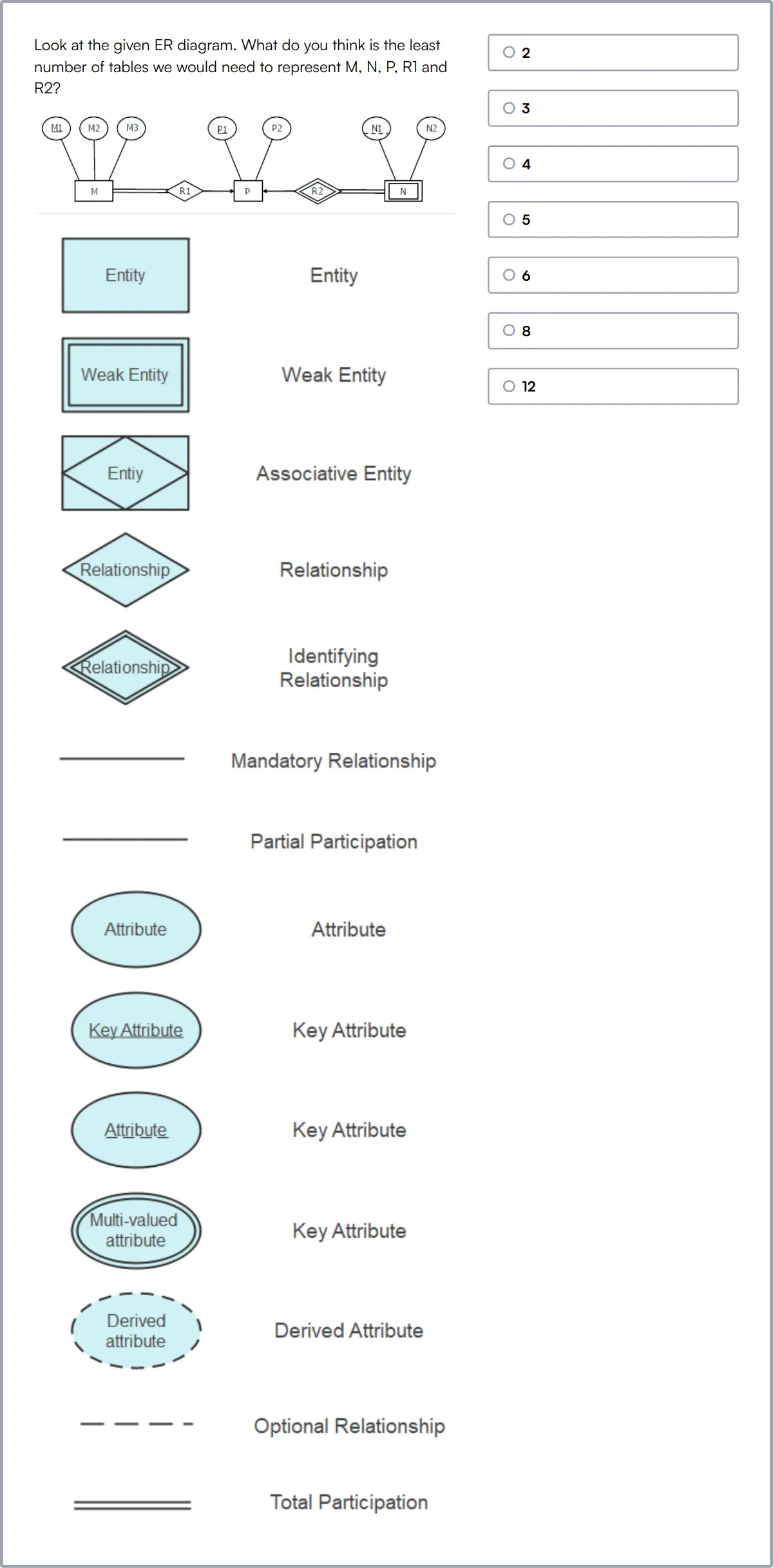
REST API Test
REST API Test evaluates a candidate's understanding of RESTful APIs and their ability to create, interact, and test them.
The test includes multiple-choice questions to evaluate knowledge of REST principles, HTTP methods, status codes, authentication, serialization formats, and best practices.
High-scoring candidates demonstrate strong skills in API integrations, REST API basics, API design, best practices, designing backend services, and coding.
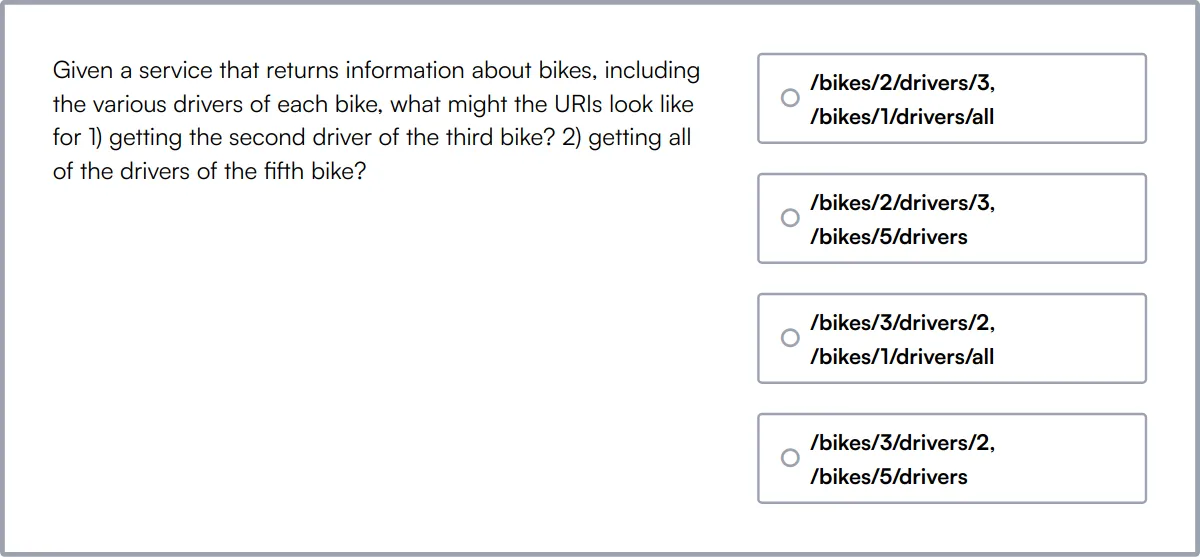
Cyber Security Assessment Test
Cyber Security Assessment Test evaluates candidates on Cyber Security basics, their ability to detect security risks, setup guards against future cyber attacks, and use cryptography techniques.
The test covers network security, cybersecurity attacks, cryptography, web security, email security, malware, data security, data governance, cybersecurity defenses, risk assessments, and network tests.
Successful candidates demonstrate strong skills in network security, cybersecurity attacks, cryptography, web security, email security, malware, data security, data governance, cybersecurity defenses, risk assessments, and network tests.
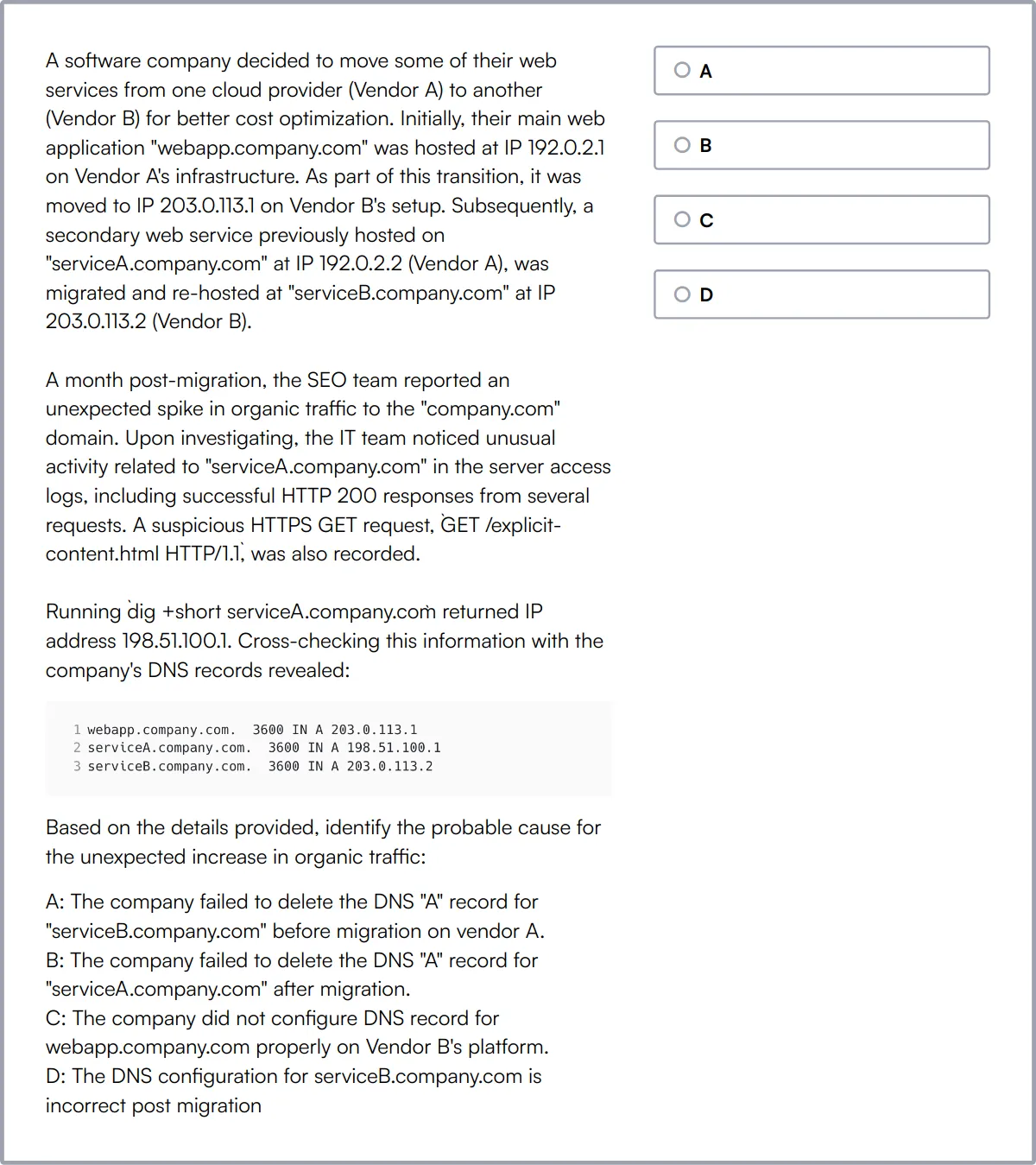
Cloud Computing Online Test
Cloud Computing Online Test evaluates a candidate's knowledge and understanding of various aspects of cloud computing.
The test assesses proficiency in cloud service models, deployment models, virtualization, security, scalability, storage and database management, networking, and orchestration.
Successful candidates demonstrate strong skills in cloud service models, cloud deployment models, virtualization in cloud computing, cloud security, scalability and elasticity in cloud computing, cloud storage and database management, cloud networking, and cloud orchestration and automation.
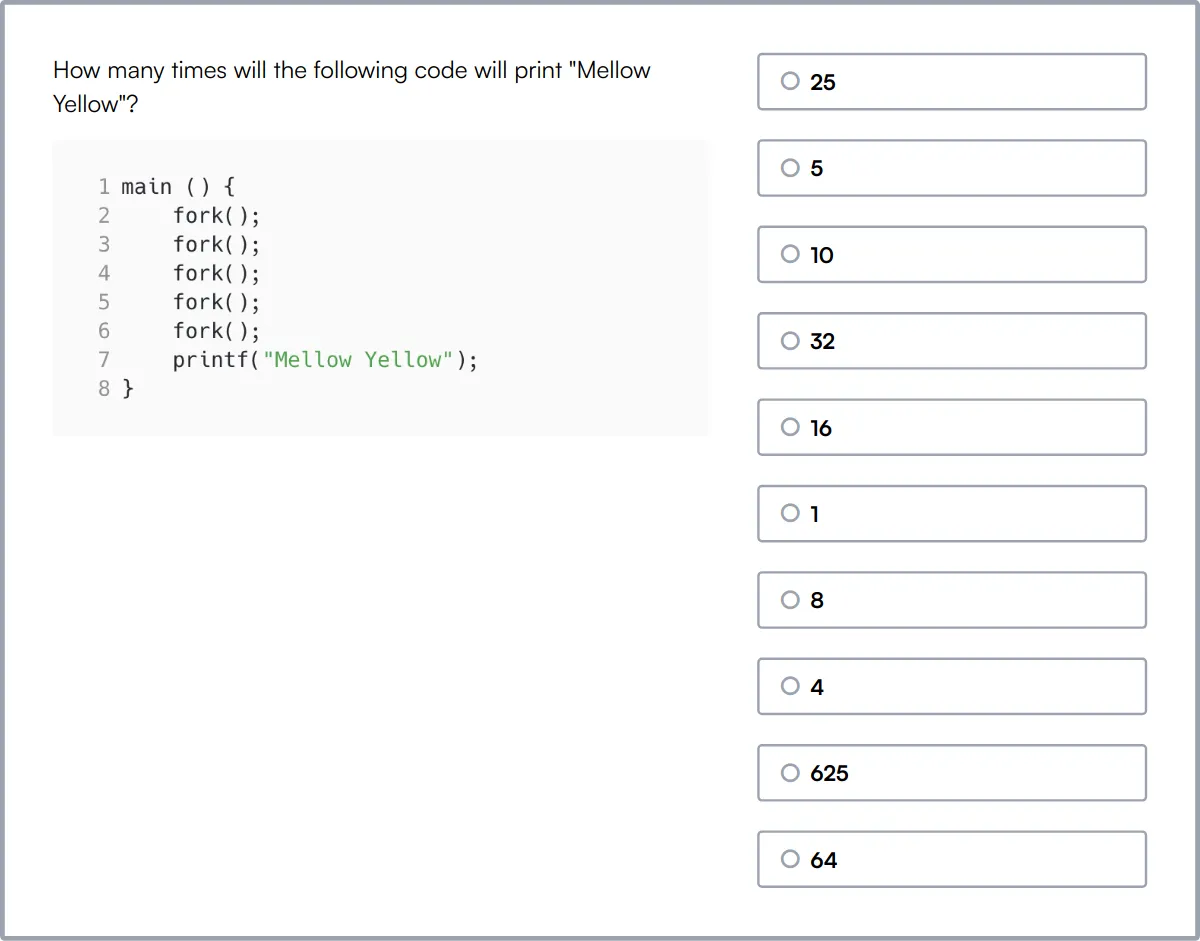
Summary: The 8 key Software Architect skills and how to test for them
| Software Architect skill | How to assess them |
|---|---|
| 1. System Design | Evaluate the ability to architect scalable, maintainable systems. |
| 2. Technical Leadership | Assess capability to guide and mentor development teams. |
| 3. Risk Management | Check skills in identifying and mitigating project risks. |
| 4. Data Modeling | Gauge proficiency in structuring and organizing data effectively. |
| 5. API Design | Evaluate the ability to create intuitive, efficient APIs. |
| 6. Performance Optimization | Assess skills in enhancing system performance and efficiency. |
| 7. Security Principles | Check understanding of securing applications and data. |
| 8. Cloud Computing | Evaluate experience with cloud platforms and services. |
System Design Online Test
Software Architect skills FAQs
What are the key skills required for a Software Architect?
Key skills include System Design, Technical Leadership, Risk Management, Data Modeling, API Design, Performance Optimization, Security Principles, Cloud Computing, Agile Methodologies, DevOps Practices, Code Review, Documentation, Stakeholder Communication, Continuous Learning, Problem Solving, Project Management, User-Centric Design, and Networking Basics.
How can recruiters assess a candidate's System Design skills?
Recruiters can assess System Design skills through technical interviews that include design challenges, asking candidates to create architecture diagrams, and discussing past projects where they designed complex systems.
What methods can be used to evaluate Technical Leadership in a Software Architect?
Evaluate Technical Leadership by discussing past leadership experiences, asking for examples of mentoring junior developers, and assessing their ability to make strategic technical decisions.
How important is Risk Management for a Software Architect and how can it be assessed?
Risk Management is crucial for identifying and mitigating potential issues. Assess it by asking candidates about past experiences managing risks, their approach to risk assessment, and specific examples of risk mitigation.
What should recruiters look for when assessing API Design skills?
Look for a deep understanding of RESTful principles, experience with designing scalable APIs, and the ability to discuss trade-offs in API design decisions.
How can Performance Optimization skills be evaluated?
Evaluate Performance Optimization skills by discussing past experiences with performance tuning, asking for specific examples of performance improvements, and understanding their approach to identifying bottlenecks.
Why is Stakeholder Communication important for a Software Architect?
Stakeholder Communication is important for aligning technical solutions with business goals. Assess it by discussing past experiences in stakeholder management and their approach to communicating complex technical concepts to non-technical stakeholders.
What role does Continuous Learning play in a Software Architect's career?
Continuous Learning is essential for staying updated with the latest technologies and best practices. Assess it by asking about recent courses, certifications, or technologies they have learned and how they apply new knowledge to their work.

40 min skill tests.
No trick questions.
Accurate shortlisting.
We make it easy for you to find the best candidates in your pipeline with a 40 min skills test.
Try for freeRelated posts
Free resources



